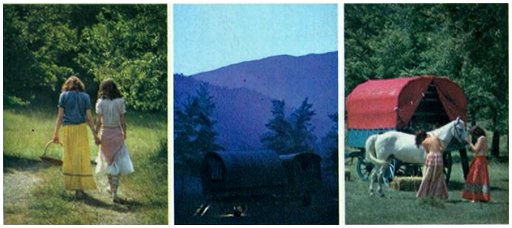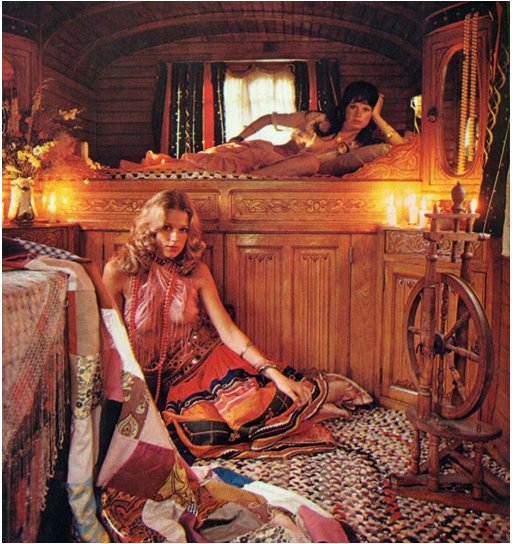November 26th, 2024 -- by Bacchus
Escapee Lesbians
“Hey, babe, do you want to run away with me? Dump your terrible husband and we’ll go live in a cosycore gypsy caravan with lots of candles and beads and filmy clothes in pretty colors. We can spin and sew and craft and make braided rugs and pretty quilts and brush the horses and never worry about pleasing some silly man, ever again. How about it?

Photos are from the April 1974 issue of Italian Playman magazine.
Similar Sex Blogging:
This entry was posted on Tuesday, November 26th, 2024 at 12:34 am. You can follow any responses to this entry through the RSS 2.0 feed. You can leave a response, or trackback from your own site.
Shorter URL for sharing: https://www.erosblog.com/?p=33489
Shorter URL for sharing: https://www.erosblog.com/?p=33489









Whelp, time to learn the flute and/or harp and work on being super chill, they might have some friends they can introduce me to :D
Justin, I’ve been thinking a lot about that idea of “being super chill” recently, because of all the women who are talking about the 4B movement or, you know, just “going gay” so they can avoid toxic men. And yet, by personal experience and observation, most of the women I’ve known who were fed up with men (in the 1970s when these images were published, or modernly) were still hungry for chill men who could shitcan the toxicity. Not long ago I saw a long conversation among social media witches, most of whom were bi or lesbian, and they were complaining about all the toxic men in their pagan circles, the kind of men who got interested in witchery because they admire and hoped to cosy up to that type of sexual confidence and feminine power that looks like easy sensuality to men with no respect. But the subtext of that whole conversation among the witches was not a desire for total separation from men (despite many jokes about that). It more like an earnest wish that more men could be found who were actually “cool” and respectful and could bring healthy masculine energy into these women’s circles (literal and metaphorical).
Men en grosse have a lot of work to do. But I share your intuition that a little bit of (or a lot of) self-improvement work, for most men, can very easily lead to being peremptorily harvested by amazing women with high standards doing fun things.
A lovely fantasy, but very few women are capable of shoeing one of those horses, or repairing a broken wagon wheel, or cutting down a tree and using an adze to convert that tree into lumber to repair the wagon – or to build another wagon when the band’s numbers increase.
It’s the old conflict; a man can build a house, but it takes a woman to turn that house into a home. Both men AND women are essential to keep civilization working.
Tech Reader, I have doubts that your “very few” claim about the capability of women is true. But I’m not a sociologist and I don’t have data to attempt a refutation. I’m just saying your comment pushed my “Oh really?” button.
I’ve known several farriers, but no female farriers. I’m not saying that there aren’t any, as I’m certain that there ARE. But the proportion is probably relatively low. Ditto wainwrights. Building or repairing a wagon, or a wagon wheel, requires skill and strength. Not that a woman COULD not; but I think my claim that few DO is valid.
For example, there are some clearly feminine names in this list of professional farriers, but not a whole lot. https://www.showhorsepromotions.com/farriers.htm
Indeed, our planet has a severe undersupply of men with internal confidence, self awareness, the knowledge and wisdom to be quiet leaders.
In the kind of idyll we’re imagining then I would expect wheels would never break, or axles, and iron work well care for would never fatigue.
And if a little reality occasionally inserted itself into this Xanadu, then I’m sure a strolling tinker would cheerfully lend a hand in exchange for a home cooked meal and a smile. Or perhaps a little silver earnt selling crafts at market might be needed.
Of course, in this Shangri La existence you probably are not using metalled roads, in which case horse shoes may not be necessary, and so obviate the need for a farrier.
Of course in this world…
Traffic, restrictions on wild camping and parking (at least in the UK), cost of power, banking requirements, interfering governments and police and so on make it all rather less attractive. Let’s by all means forget all that, and opt for the fantasy.
As for female farriers, then I had for many years a female friend and intermittent lover who blacksmithed. She was happy to declare she was the best man in any room, and was completely and blissfully heterosexual. Though weirdly one thing she used to be hopeless at, and always asked me to do was reversing a trailer.
@Justin
may I commend the Admirable Crichton, a favourite classic of cinema.
Met a female blacksmith just two years ago, myself, at the Maine Forest and Logging Museum, in Bradley, Maine, USA.
Finagle, as you suggest, I’m not entirely clear why we expect our mythical band of free-roving lesbians to abstain from commerce with men. Indeed, as other posts in this comment thread have already suggested — not to mention my OP “seduction of an unhappy wife” setup for the fantasy — there are bisexual women in this fantasy. And the trope of the bisexual who has mostly but not entirely sworn off men is everywhere. There’s even a TikTok meme about bisexuals ladies who mostly love women and feel distaste toward men… “except for this one guy, who we keep around because he’s not so bad.”
Tech Reader, I wasn’t taking issue with the part of your comment about rarity, so much as the part about capability. If you’re arguing that relatively few women do these traditionally-male-assigned tasks and occupations or have honed the necessary skills, well duh; that’s the world we live in. But no, you suggested that few women are capable of them, which on initial reading seems sexist or misogynist. Man or woman, the necessary strength for blacksmithing comes from wielding the hammer one whole hell of a lot. Had you said there are few women who’ve taken up these occupations, I’d agree with you, and that could set up a lively conversation about reasons, to potentially include socialization and gender roles and cultural bias and training opportunities and, and, and, a very long list of possible reasons before we ever got to the capabilities of women.
To put this another way: I’m perfectly capable of working a sewing machine or hand-stitching a fine seam, but much to the disappointment of my dear departed mother, I don’t know how. Could I learn? Yes. Have I learned? No. Tell me that relatively few men in the USA know how to sew, I’d agree with you, but remind you that it used to be a traditionally-male occupation, and suggest that if you seek a skilled male tailor in 2024 you’ll have no trouble at all finding one at your nearest bespoke haberdashery. (Finding one of those, on the other hand, will necessitate a visit to one of the world’s great cities. Bring both of your wallets.) Tell me that skilled male tailors are somewhat rare, and I might agree; but tell me that men who are capable of sewing are few or rare, and I’ll give you back a rousing “Balderdash!” Thus with women and blacksmithing, farriering, wainwrighting, et cetera.
Having been peripherally involved in some of the debate around trans inclusivity in sport in the UK, there seems to be a lot of very fine logic chopping involved, where ardent egalitarians one day are screaming for equality and the next screaming for m->f trans women to be excluded because of the evident superiority of a body that’s been through puberty as a male.
It seems likely in elite sport that male puberty confers a baseline advantage in strength but outside elite sport the advantages fall within normal variation. Which is to say the range of strengths of men and women are highly overlapping, such that few professions which require strength are closed to women.
All of which is a long winded way of saying I agree with Bacchus about capability vs any other grounds for male or female prevalence in a profession.
Historically a lot of professions I grew up being told by society were ‘womens work’ were largely if not exclusively male preserves under the Victorians or earlier. The World Wars changed a lot of that, and society shifted opinions. Sometimes completely, sometimes just towards equality. Women filled a lot of professions during the wars that were previously or subsequently male dominated.
Finagle do you think Gilligan’s Isle was inspired by that interesting film?
No idea, I’ve never seen Gilligan’s Isle, but it’s possible.